Table of Contents
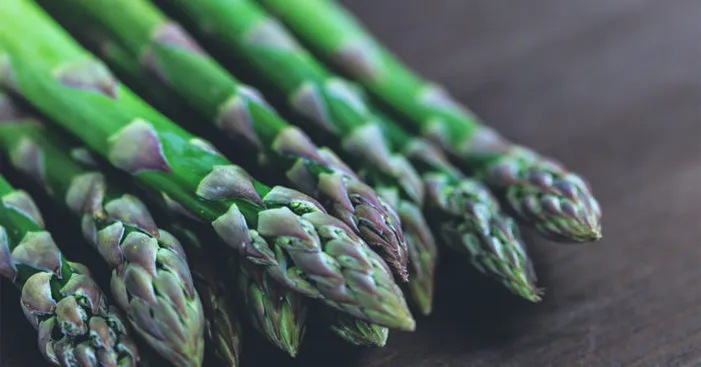
Asparagus calories come from vitamins, fibers, minerals, and other beneficial components.
Whether you like to consume it in risotto or on its own, asparagus adds a distinguishing flavor to the dish.
This vegetable matures during late spring (April to June) and can be white, green, or even purple.
In fact, the color does not depend on the type of asparagus but rather the growing methods.
To grow white asparagus, the farmers cover the plant with dirt or a black plastic bag.
By doing that, the plant can no longer use sunlight to make chlorophyll therefore it grows without a green color.
The purple asparagus contain anthocyanin, a pigment that gives them colors such as red, purple, or blue.
In this article, we gathered everything you need to know about asparagus calories, the nutritional composition, the health benefits, and the possible side effects, alongside tips on how to buy, consume and store asparagus.
What is asparagus?

Scientifically, this plant goes by the name “Asparagus officinalis” and is part of the Liliaceae family alongside garlic, onion, and leeks.
With China, Germany, and the USA as the top producers, asparagus grows in any part of the world.
The plant flourishes in a slightly cold environment and reaches about 8 inches when harvested.
However, the cultivation of asparagus requires a lot of patience as it needs about 5 years to mature from seeds.
Because of that, it is a bit expensive and it has a very royal reputation among other vegetables.
Asparagus calories:
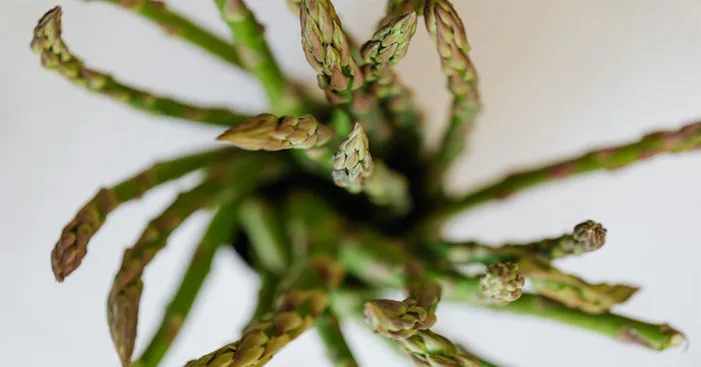
Nutritional values in asparagus calories:
Like all sorts of vegetables and fruits, asparagus are mainly made of water and has few calories.
For a vegetable, asparagus tend to contain a good amount of proteins with 2.16g per serving of 0.5 cups (90g).
Carbs are the essential component in asparagus responsible for its energy.
As for the fat content, this vegetable has little to no fats with only 0.19g per serving.
Also, asparagus is a good source of dietary fibers such as:
- Pectins and mucilages: give the buds a soft texture.
- Celluloses, hemicelluloses, and lignin: are responsible for the fibrous aspect of the stems.
Asparagus calories are rich in vitamins such as vitamin C, vitamin E, vitamin A, vitamin K, and B vitamins (mostly folic acid).
In addition, this vegetable is also a great source of minerals including potassium, calcium, iron, copper, zinc, selenium, and magnesium.
This is the nutritional data for a serving of boiled asparagus (0.5 cups, 90g):
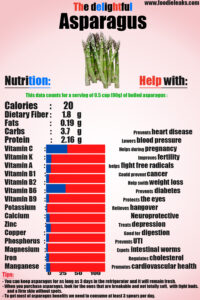
- Calories: 20
- Fibers: 1.8g
- Fats: 0.19g
- Carbs: 3.7g
- Proteins: 2.16g
- Sugars: 1.17g
- C vitamin: 10%
- K vitamin: 70% (for a person that weighs 145 lbs.)
- A vitamin: 36%
- B1 vitamin: 9%
- B2 vitamin: 8%
- B6 vitamin: 5%
- B9 vitamin: 33%
- Potassium: 5%
- Calcium: 2%
- Zinc: 6%
- Copper: 8%
- Phosphorus: 5%
- Magnesium : 3%
- Iron: 5%
- Manganese: 7%
Health benefits in asparagus calories:

Asparagus calories general benefits:
Antioxidant properties:
This vegetable is very rich in antioxidants including vitamin A, vitamin C, flavonoids Glutathione, and polyphenols.
The combination of these natural antioxidants protects the body against free radicals and oxidative stress.
As for purple asparagus, this type has an additional antioxidant called anthocyanin which reduces the risk of heart disease.
Lowers blood pressure:
A rise in blood pressure may cause many health diseases including brain strokes and cardiovascular diseases.
Today, more than 1 billion people suffer from hypertension around the world and it is pretty much scary.
To treat this issue, some doctors suggest increasing potassium intake and reducing the consumption of salt.
In fact, potassium lowers blood pressure by relaxing the arterial walls and flushing out excessive salt in the body, and help
A daily serving of asparagus (1/2 cup, 3 spears) offers about 6% of our daily need for potassium.
A mice study confirms that animals that eat asparagus in their diet experience a drop of 17% in their blood pressure compared to those who didn’t eat asparagus.
Improves digestion:
Like fruits and vegetables, asparagus is rich in dietary fibers with more than 7% of the daily need per serving.
Asparagus fibers are mainly insoluble and this type regulates bowel movement and increases the volume of stool.
Also, it contains about 0.5g of soluble fibers per ½ cup (3 spears, a serving).
In the stomach, soluble fibers turn into a gel form and offer nutrition for gastrointestinal bacteria such as lactobacillus and Bifidus.
With enough guts bacteria, the body shall experience smoother digestion and better immunity.
May protect from cancer:
Asparagus calories are rich in many carotenoid pigments such as lutein, zeaxanthin, capsanthin, and beta-carotene.
Many studies prove that consuming carotenoid-rich food reduces the risk of developing cancer.
In addition, this vegetable also contains a small quantity of saponin which have a toxic effect on cancerous human cells.
Also, asparagus offers more than 30% of the daily need in vitamin B9 which can prevent lung and colon cancers.
Helps develop the fetus:
As mentioned above, asparagus contains folic acid (vitamin B9) which is essential for the production of cells and hemoglobin.
During pregnancy, moms should consume about 400 mcg of folate acid daily to prevent birth defects.
Not only is vitamin b9 essential for cell development, but it is also involved in the production of genetic material.
Because of that, doctors often recommend consuming peanuts, liver, fruits juices, and asparagus during pregnancy.
Helps losing weight:
Asparagus calories are very low with only 20 calories per serving (90g, 1/2cup).
Not only that, but it is also fat-free and has very low in sodium (0.05% RDI) and carbs content (2% RDI).
With that composition, asparagus are perfect for a keto diet or if you are on a journey to lose a few pounds.
In addition, the rich fiber content in asparagus calories promotes a longer feeling of satiety which delays hunger.
Therefore, consuming asparagus daily would make you feel less hungry without adding many calories to your diet.
Asparagus calories benefit men:
Calories in asparagus come from different types of nutrients including vitamin B6 and folic acid.
These two components stimulate the production of Histamine, a hormone that can enhance the sexual experience.
Also, asparagus has antidepressant properties which help increase men’s fertility by calming down the stress.
Precautions before consuming asparagus calories:

Consuming too much of asparagus calories may cause a few unwanted side effects including:
Health issues:
Possible allergic reactions:
Especially for people who already have an onion allergy, are more likely allergic to asparagus as well.
After consuming large quantities of asparagus, some people reported symptoms including:
- Rash and Itching.
- Dry coughing.
- Nausea.
- Difficulties breathing.
- Anaphylactic shock (hospitalization).
Troubles in the gastrointestinal system:
Due to its rich content of carbs, eating a lot of asparagus calories may promote gas production in the stomach.
This is because asparagus calories mostly come from its complex composition of carbohydrates.
These carbs are mainly glucose, galactose, and fructose for which we don’t have the enzyme necessary to digest them.
Thus, these complex carbs get fermented in the stomach and this leads to excessive gas production.
In addition, asparagus calories also contain asparagusic acid, a sulfur compound that has a distinguishing odor.
Thus, consuming a lot of asparagus causes a very bad defecation and urination smell within the next 2 days.
Intestinal obstruction:
Asparagus calories offer a great number of dietary fibers with more than 8% of the daily need per 3.5oz (100g).
These fibers are indeed essential for the digestive system but too much of them could hurt.
In fact, by consuming too many fibers the stool loses its moisture and becomes drier.
This would slow bowel movement by clogging the intestines which cause constipation and stomachache.
Interference with medications:
Blood pressure drugs:
Among the many benefits of asparagus, it helps balance blood pressure and regulates blood flow.
This could be very beneficial for people who deal with high blood pressure.
However, most patients with hypertension issues already take medicines that lower blood pressure.
When they consume asparagus alongside these drugs, their blood pressure could drop to dangerous levels.
Bladder control drugs:
Especially for people who deal with kidney stones and who often take urination stimulation drugs.
Once they consume a lot of asparagus, these people may add to the effect of the drugs and may risk intensive urination.
Consuming asparagus calories:
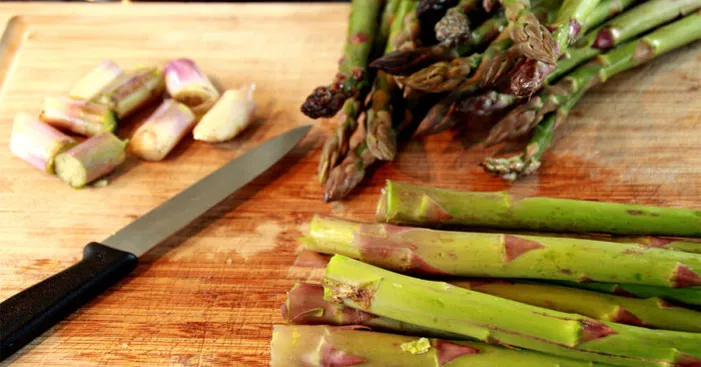
Asparagus may be tricky if you are dealing with them for the first time.
In fact, the buds require less cooking time than the stems which causes difficulties dealing with this vegetable.
When you cook asparagus in boiling water, the buds would fall off right when the stems are perfectly done.
This is why chefs recommend following simple steps to ensure even cooking:
- Put asparagus in a bunch (10 to 12 spears) and tie them if possible using a cotton string.
- Cut the bottom of the spears so that they all have the same height.
- Now place the bunch of asparagus vertically in boiling water leaving the buds out of the water.
- Cover the pot and boil the water for 5 to 7 minutes.
By following these simple steps, the stems cook faster than the bud and you shall get evenly cooked asparagus.
The above method is the most common one, but here are a few other techniques that also work well:
- To avoid the non-cooked raw edges, using both hands apply a little pressure to the bottom side of the asparagus until it breaks.
- It shall break right where the soft part of the stem meets the hard stringy part in the bottom.
- You can use the hard bottom part of the spear in broth and sauces or just throw it away.
Asparagus doesn’t require too much time to get cooked properly:
- Frying asparagus in butter or olive oil. (10 minutes).
- Baking asparagus in the oven. (20 minutes at 350°F/180°C)
- Steaming asparagus (12 to 18 minutes)
- Cooked in a mix of lemony water and salt in the microwave (8 minutes).
The delicious taste of asparagus would still be noticeable even with spices and sauces.
Buying Asparagus:
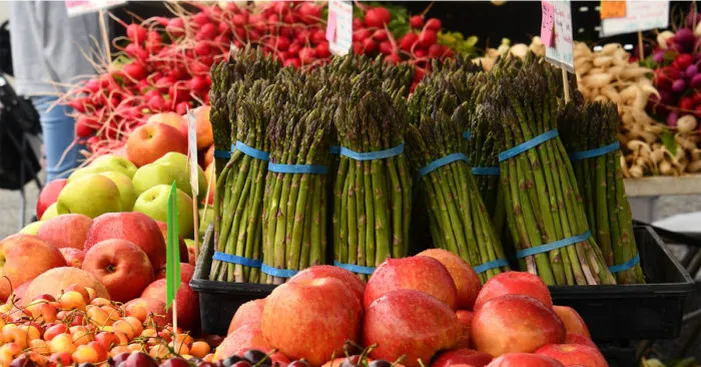
In the USA, specifically on the West-side of the country, asparagus becomes available in the market starting in late February.
As for the Eastern side of the country, this vegetable becomes available between April and June.
You can also find asparagus during winter mainly imported from hotter regions in the world.
Since this vegetable is more than 90% water, it is best to consume it as fresh as possible to get the most of its taste and benefits.
For example, a room temperature asparagus could lose half of its vitamin C in just 2 days.
Most people have a common misconception that thicker asparagus is hard and not tender!
However, make sure you buy asparagus spears that are similar in thickness to ensure even cooking.
This is wrong, the thicker the spear of asparagus is, the more tender it is on the inside.
Regardless of the thickness of asparagus, here are some easy tips to choose them:
- Breakable not soft.
- The buds should be tight.
- Smooth skin without dark spots.
Storing Asparagus:
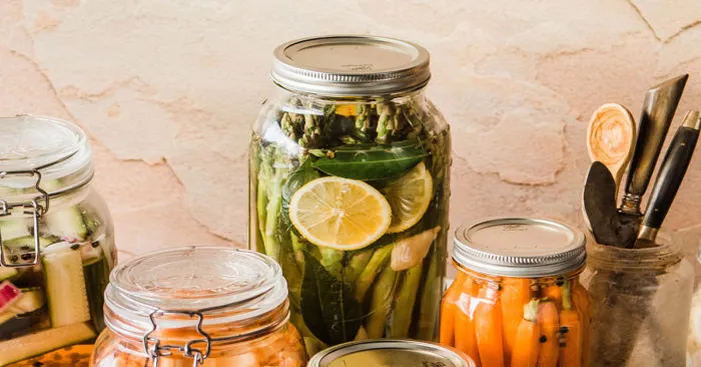
To store fresh asparagus, you can simply wrap it in a piece of cloth or paper towel and put it in the fridge for up to 3 days.
Nonetheless, for those who want to have asparagus throughout the year, you can either:
Pickled in a jar:
- Cook the asparagus spears in boiling water for 20 minutes.
- Place the boiled asparagus in a jar filled with a mix of lemon water and salt.
- You can store the jar in your kitchen pantry and it shall last several months.
In the freezer:
- Again, place the asparagus in boiling water for 3 to 5 minutes then cool them in ice water.
- This hot and cold process would preserve the taste and texture and sterilize asparagus from possible harmful bacteria.
- After blanching asparagus, you can store them in freezing bags and freeze them for up to 3 months.
